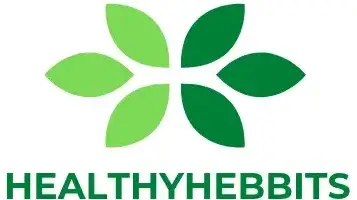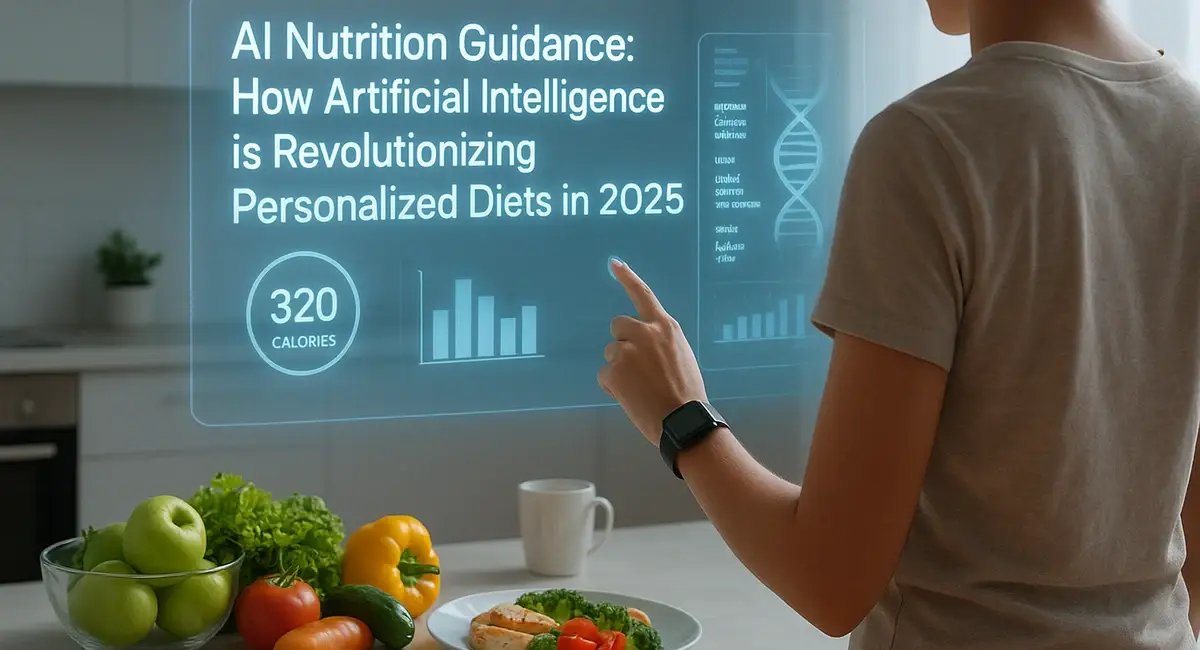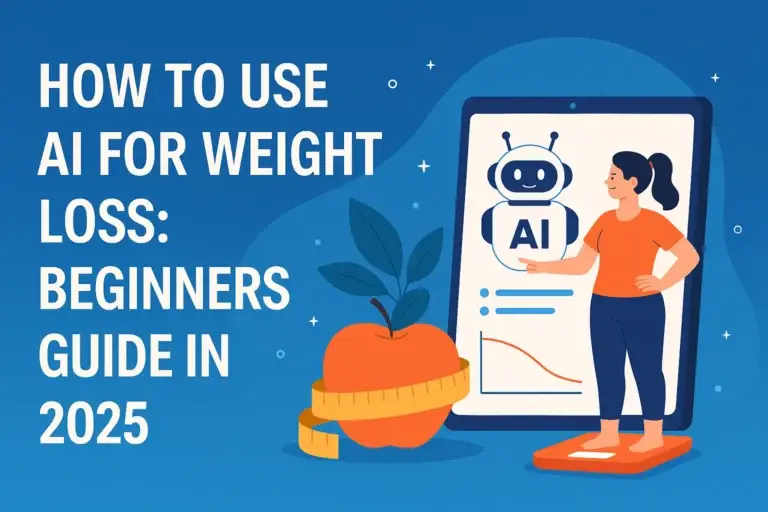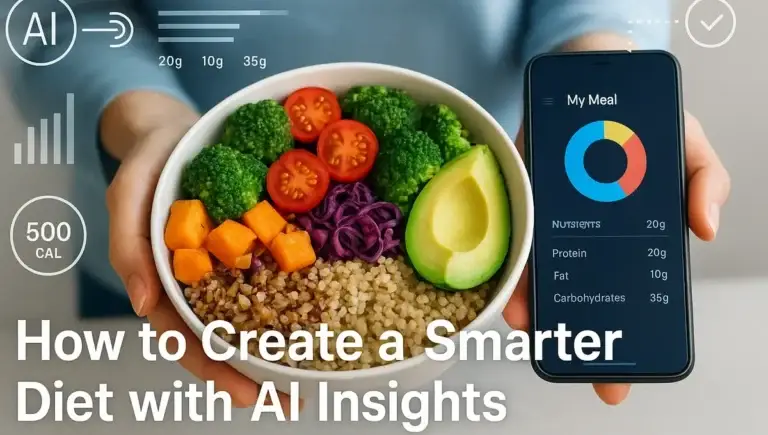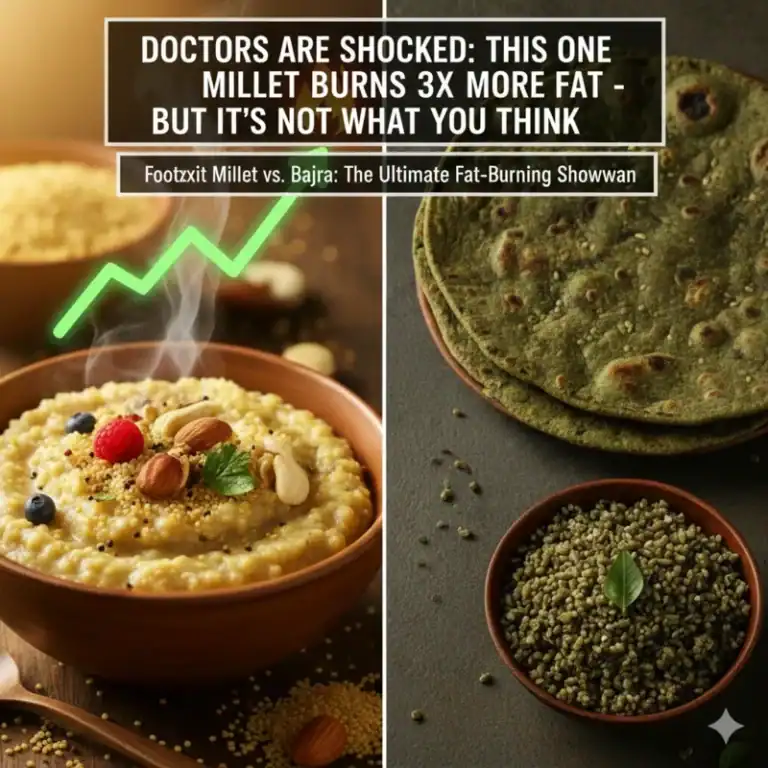AI Nutrition Guidance: How Artificial Intelligence is Revolutionizing Personalized Diets in 2025
The rise of artificial intelligence in nutrition has transformed how we approach food, health, and wellness. No more one-size-fits-all diet plans or generic calorie counting apps. Today’s AI-powered tools create truly personalized diets that adapt to your unique body, lifestyle, and goals in real-time.
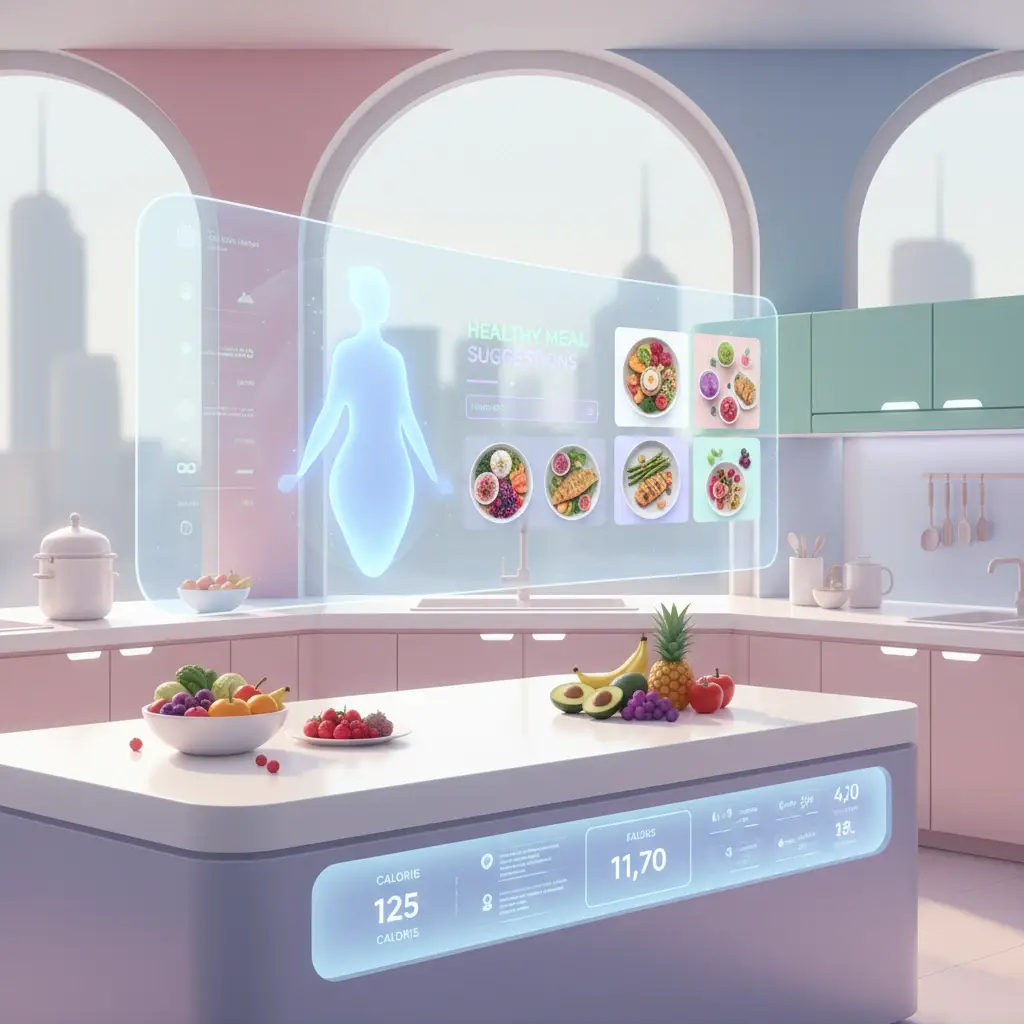
In this guide, you’ll discover how AI is reshaping nutrition planning, explore cutting-edge tools making waves in 2025, and learn practical ways to harness this technology for your health journey. Whether you’re curious about AI diet plans or ready to embrace personalized meal planning AI, you’re about to unlock the future of nutrition.
What is AI Nutrition Guidance?
AI nutrition guidance uses artificial intelligence to analyze your personal health data and create customized dietary recommendations. Think of it as having a nutritionist who knows everything about your body’s needs, available 24/7 in your pocket.
Unlike traditional diet planning that relies on general guidelines and periodic consultations, AI nutrition apps continuously learn from your:
• Daily food intake and reactions.
• Exercise patterns and recovery needs.
• Sleep quality and stress levels.
• Health metrics from wearable device’s.
• Personal food preferences and restrictions.
This dynamic approach means your AI diet plans evolve with you. Had a stressful week? Your AI might suggest magnesium-rich foods. Training for a marathon? It’ll adjust your carb intake accordingly. The personalized meal planning AI adapts faster than any human nutritionist could.
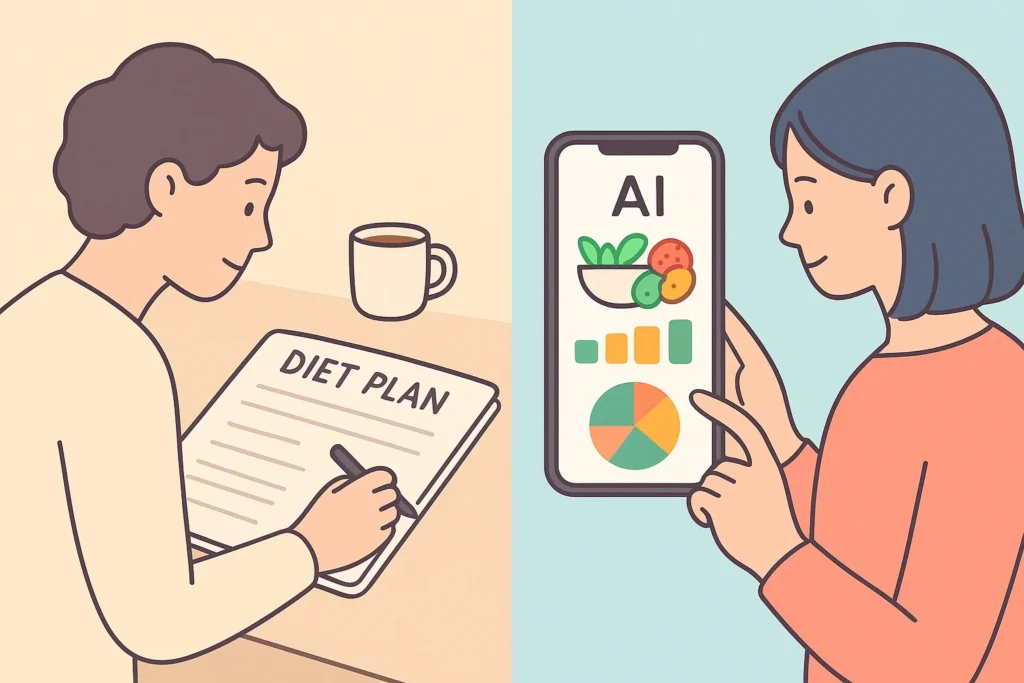
The Technology Behind AI Diets
The magic happens through sophisticated machine learning algorithms that process vast amounts of health data. Here’s how AI transforms numbers into nourishment:
Data Collection:
Your smartwatch tracks heart rate variability, sleep stages, and activity levels. Your phone logs meals through photo recognition. Blood glucose monitors share real-time readings.
Pattern Recognition:
Machine learning diet plans identify how your body responds to different foods. Maybe you perform better with higher protein breakfasts, or certain foods spike your blood sugar more than others.
Predictive Analytics:
AI in health and wellness doesn’t just react—it anticipates. Based on your patterns, it predicts energy dips and suggests preemptive snacks or meal timing adjustments.
Continuous Learning:
Every meal, workout, and health metric teaches the AI more about you. These data-driven diets become increasingly accurate over time, creating a truly personalized nutrition ecosystem.
Benefits of AI-Driven Nutrition Guidance
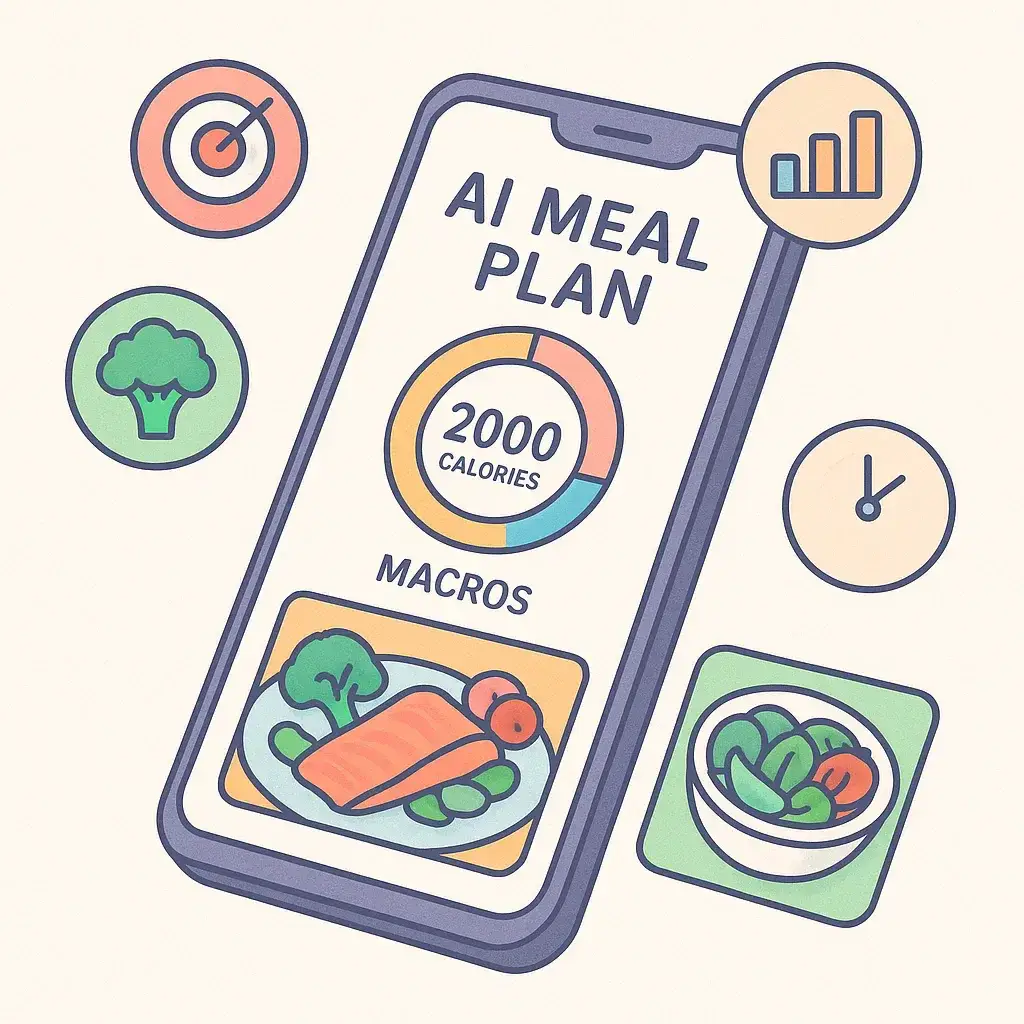
Your personalized diet plan AI considers factors traditional diets ignore:
• Genetic predispositions to certain Nutrient A
• Circadian rhythm and optimal eating windows•
• Stress-induced nutritional needed
• Exercise recovery requirements•
• Hormonal fluctuations
Precision Tracking:
Forget estimating portions or manually logging calories. AI fitness tracking uses image recognition to identify foods and calculate nutrients instantly. Some apps even analyze your grocery receipts to suggest healthier swaps.
Time-Saving Convenience:
Customized meal planning becomes effortless when AI handles the heavy lifting:
• Weekly meal plans generated in seconds•
• Grocery lists organized by store lay Out
• Recipe suggestions based on what’s in your fridge•
• Meal prep schedules optimized for your routine
Mindful Eating Support:
AI for mindful eating goes beyond counting calories. It recognizes emotional eating patterns, suggests stress-reduction techniques, and helps build healthier relationships with food through personalized coaching.
How AI Tools & Apps Changing the Nutrition Landscape
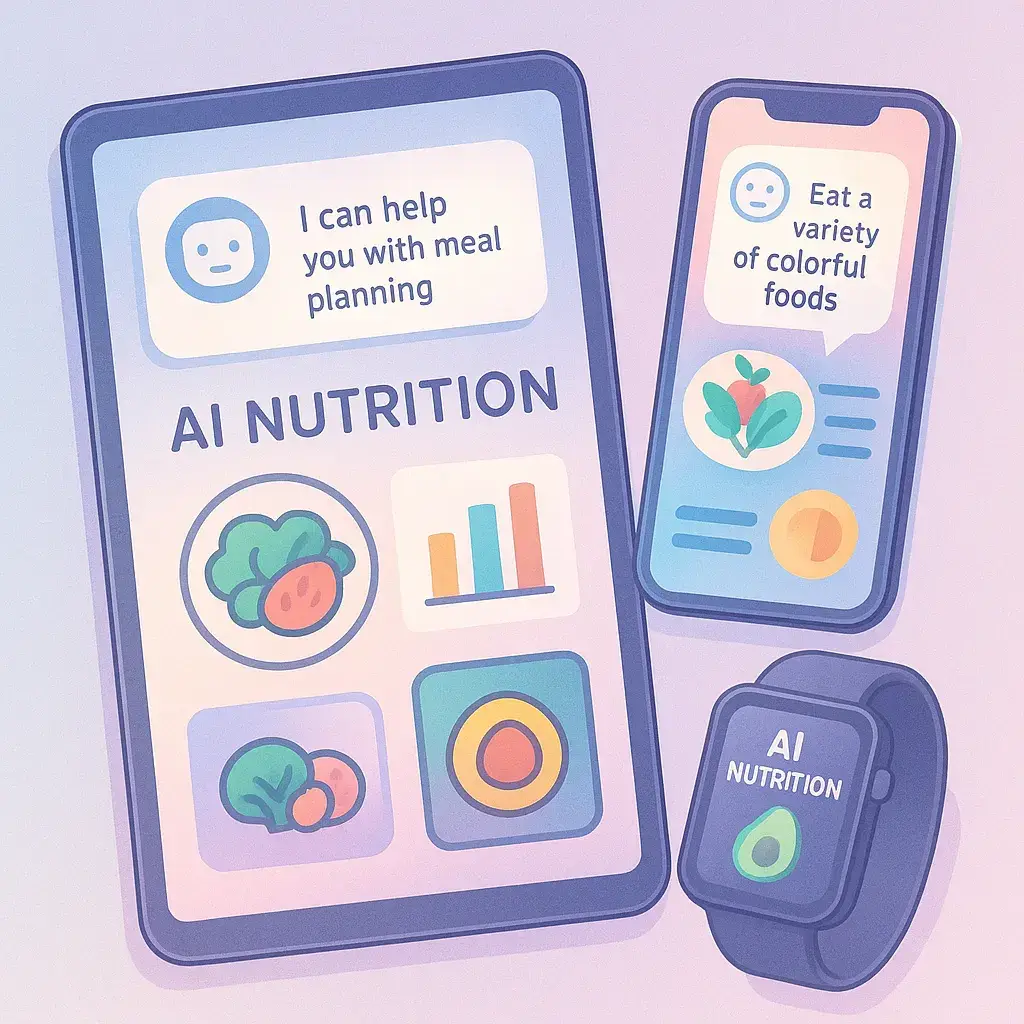
The AI nutrition coach ecosystem has exploded in 2025. Here are the game-changers:
AI Meal Planner Appa
•NutriGenius Pro: Uses computer vision to analyze meals and suggests real-time improvement A
•MealMind AI: Creates weekly plans based on your health goals, budget, and cooking skulls
•Plate IQ: Specializes in managing multiple dietary restrictions simultaneous lay.
AI Fitness + Diet I integration
• FitFuel 360: Syncs with all major fitness trackers to adjust nutrition based on workout I intensity
• Recovery Chef: Focuses on post-workout nutrition optimize time
• Endurance Eats: Designed for athletes with real-time fueling strategies.
AI Chatbot Diet Assistance:
• Nutri Bot Plus: Your virtual nutritionist AI available via voice or text 24/7
• Diet Buddy AI: Offers motivational support alongside nutritional Guidance
•Meal Mentor: Provides cooking instructions and substitution suggestions in real-time.
These smart nutrition apps 2025 represent just the beginning. Many offer AI dietitian alternatives that provide professional-grade guidance at a fraction of the cost.
AI in Weight Management & Preventive Health
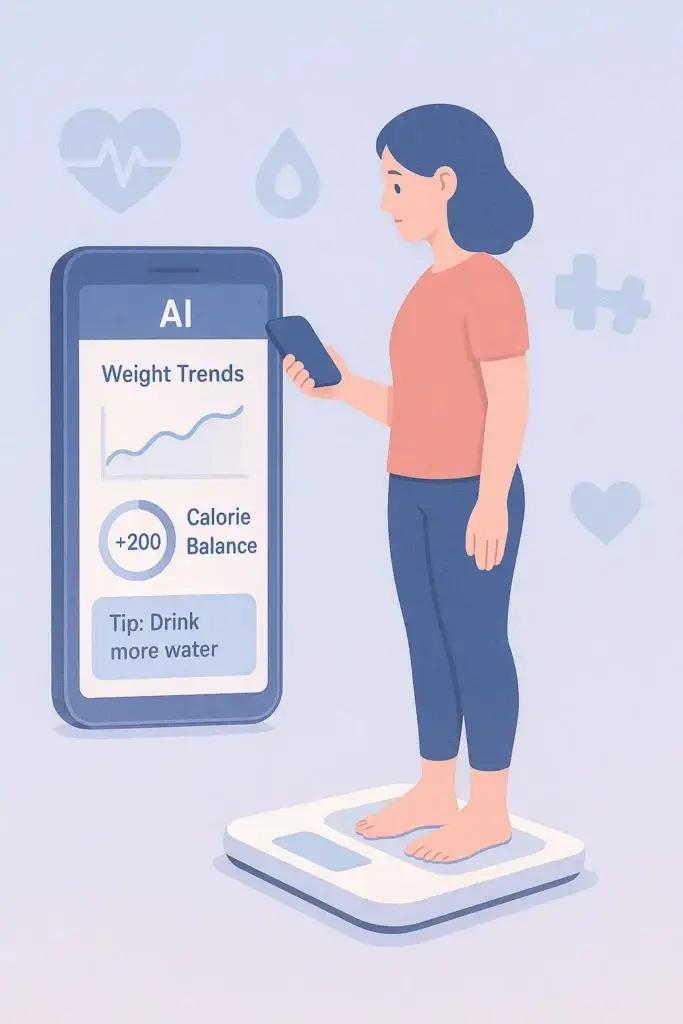
AI weight loss plans have revolutionized how we approach body composition goals. Instead of restrictive diets, AI creates sustainable strategies by:
• Identifying your unique metabolic Pattern A
• Predicting plateau periods before they happens
• Adjusting macronutrients based on hormonal cycle
• Suggesting meal timing for optimal fat burning.
In preventive healthcare, AI shines even brighter. AI in preventive healthcare can detect early warning signs of:
• Prediabetes through glucose pattern analysis
• Nutrient deficiencies via symptom Tracking
• Food sensitivities through elimination protocols•
• Cardiovascular risks based on dietary inflammation markers.
AI and metabolic health tools now predict how different foods will affect your blood sugar before you eat them, helping millions manage diabetes more effectively.
Limitations & Challenges of AI in Nutritionist
Despite the benefits, AI diet tracking isn’t without concerns:
Data Privacy:
Your health data is incredibly personal. Questions remain about:
• Who has access to your dietary information—to
• How companies use aggregated health Data
• Security of sensitive medical In formation
• Potential insurance implications
Algorithm Dependence:
Over-relying on AI can disconnect us from intuitive eating. Some users report:
• Anxiety when apps are In available
• Difficulty making food choices I independently
• Loss of cultural food Connections
• Reduced social flexibility around meals
Ethical Consideration:
AI healthy eating guide algorithms may inadvertently:
• Reinforce diet culture mess aging
• Overlook cultural dietary practiced
• Create unrealistic body standard
• Ignore socioeconomic food access issues.
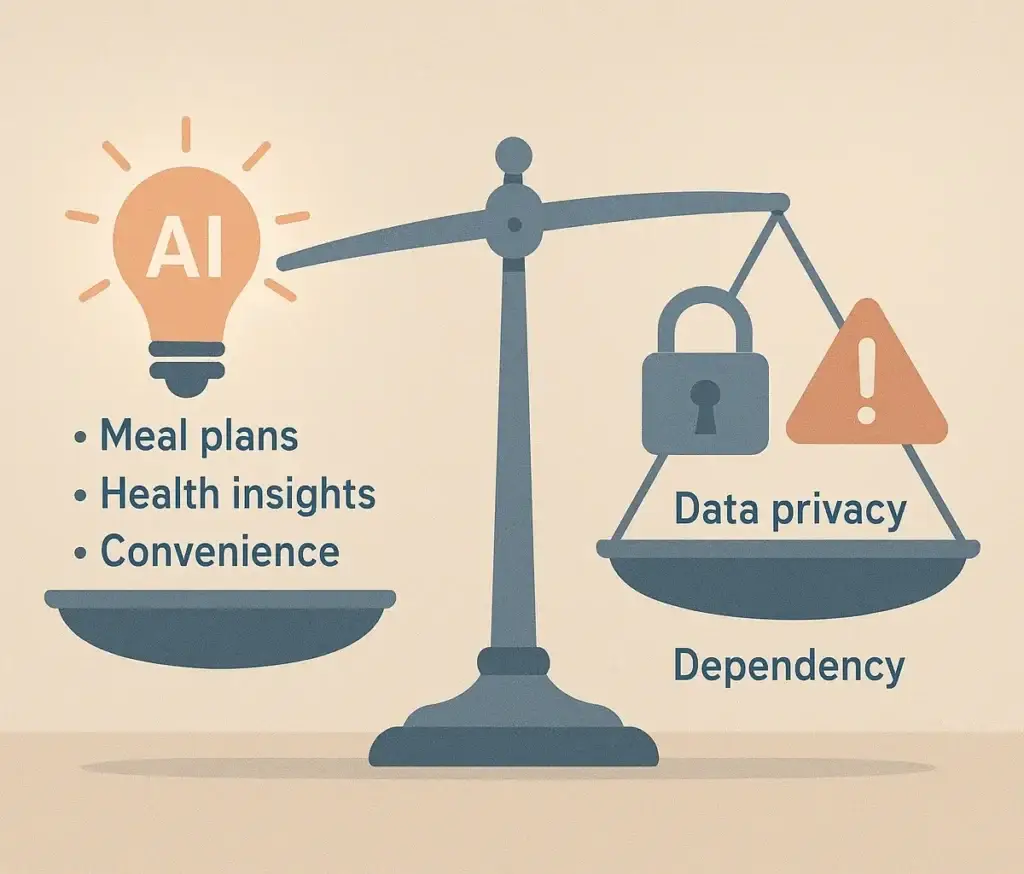
The Future of AI Nutrition in 2025 and “Beyond
The future of AI in nutrition 2025 promises even more personalization:
Predictive Nutrition:
Imagine AI predicting nutritional needs days in advance based on:
• Weather patterns affecting mood and appetite• Scheduled stressful event A
• Travel and timezone changed
• Seasonal nutrient requirements
Genetic Integration:
DNA testing meets AI to create diets based on:
• Genetic metabolism variations•
• Predisposition to nutrient deficiencies•
• Optimal macronutrient ratios•
• Food sensitivity predictions
Advanced Wearables:
Digital health AI trends point toward:
• Non-invasive continuous glucose monitors•
• Real-time nutrient level Tracking
• Gut microbiome analysis Device’s
• Stress hormone monitoring
The future of personalized nutrition will make today’s AI seem primitive by comparison.
Practical Tips: How to Get Started with AI Nutrition
Ready to embrace AI balanced diet technology? Follow these steps:
1. Choose Your AI Nutrition Apps
Research the best AI apps for meal planning 2025:
• Read user reviews focusing on your specific Goals
• Look for apps that integrate with your existing Device’s
• Start with free trials before comforting
• Ensure the app respects data Privacy
2. Connect Your Device’s
Maximize AI personalized calorie tracking by syncing:
• Fitness trackers or smartwatches.
• Smart scales with body composition analysis.
• Sleep tracking Device’s.
• Blood pressure or glucose monitors.
3. Set Realistic Goal
AHelp your AI help you:
• Be honest about your current Habits.
• Set achievable short-term target’s.
• Focus on health improvements, not just Weight.
• Allow the AI time to learn your Pattern A.
4. Engage A actively
The more data you provide, the smarter your AI becomes:
• Log meals consistently for at least two week’s.
• Note how foods make you Deep.
• Track energy levels and Food.
• Report any digestive issues.
Conclusion: AI as Your Personal Nutrition Partner
AI nutrition guidance has transformed from a futuristic concept to an accessible reality. These intelligent systems offer unprecedented personalization, making healthy eating more achievable than ever before.
Remember, your personalized diet with AI isn’t meant to replace human connection or professional medical advice. Instead, think of it as a knowledgeable companion supporting your wellness journey 24/7. The best approach combines AI’s data-driven insights with your own body awareness and, when needed, guidance from healthcare professionals.
As we advance deeper into 2025, the future of AI in wellness continues to evolve. By embracing these tools thoughtfully, you’re not just following a diet—you’re pioneering a new era of personalized health optimization.
FAQ Sections
1.What is the best AI app for meal planning in 2025?
The best AI meal planning app depends on your specific needs. NutriGenius Pro excels at visual meal analysis, while MealMind AI offers superior grocery integration. FitFuel 360 is ideal if you’re highly active. Try free trials to find your perfect match.
2.How accurate are AI diet plans?
AI diet plans in 2025 boast 85-90% accuracy when provided with consistent, quality data. Accuracy improves over time as the AI learns your patterns. Most users report significant improvements in energy and health markers within 4-6 weeks.
3.Can AI replace a nutritionist?
AI serves as an excellent daily companion but shouldn’t completely replace professional nutritionists, especially for complex health conditions. Think of AI as your first line of support, with human experts available for specialized needs.
4.Is AI safe for weight management?
When used responsibly, AI weight management tools are safe and effective. Choose apps that promote sustainable habits rather than extreme restrictions. Always consult healthcare providers if you have underlying health conditions.
5.How is AI changing personalized nutrition?
AI is democratizing access to personalized nutrition by making custom diet plans affordable and accessible. It’s shifting focus from generic advice to truly individualized recommendations based on real-time health data, making optimal nutrition achievable for everyone.
